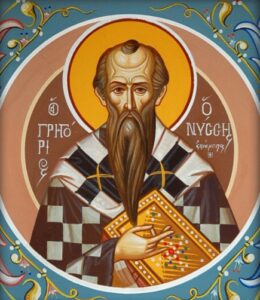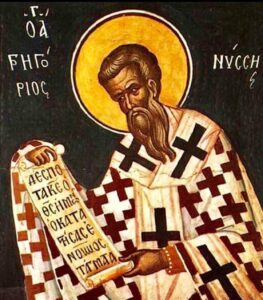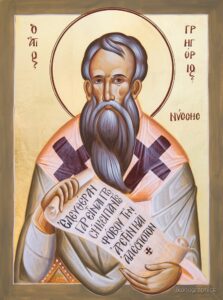St. Gregory of Nyssa – Jan 10 I Orthodox Trinitarian Theologian, Cappadocian Father I (A. D. 335 – 394)

St Gregory, Bishop of Nyssa, was born at Caesarea, Cappadocia (now Kayseri in Turkey) in A. D. 335. He came from a large religious Christian family of ten children, comprising five boys and five girls. He was a younger sibling in a distinguished family that gave the Church many years of service and at least five saints. He, the younger brother of St. Basil of Caesarea received an excellent education. Gregory was educated in his native province but was more deeply influenced, by the home schooling of family members, mainly his brother St. Basil of Caesarea, his sister St. Macrina and their friend, St. Gregory of Nazianzus. He was the most philosophically adept of the three, along with elder brother St Basil and friend Gregory of Nazianzus, Gregory of Nyssa forms the third of a trio of Christian thinkers, collectively known as the Cappadocians Fathers, who established the main lines of Orthodoxy in the Christian East.
Gregory’s parents had suffered persecution for their faith. He writes that they “had their goods confiscated for confessing Christ’. His birth and upbringing came at a time when the Arian disputes were at their height. In 360, he turned to religious studies and Christian devotion, to the monastic life, under Basil’s inspiration and guidance and the upbringing and philosophical training in the saintly family. St. Gregory himself, began his life with a great spiritual heritage from his family, spent his life striving for perfection. After a brief spell as Reader in the church, he began his adult life as a teacher of rhetoric, but began to devote more of his energies to defending Orthodox Christianity against the threat of Arianism. In A. D. 372 he accepted Basil’s invitation, although rather unwillingly, to become the Bishop of the Cappadocian city Nyssa (Secunda, now Niksar in Turkey) and was ordained by his brother St. Basil, Metropolitan of Caesarea.

At the death of his brother St. Basil in 379, Gregory was deeply grieved at the loss of his brother and spiritual companion, he delivered a funeral oration for him, and completed Saint Basil’s study of the six days of Creation, the Hexaemeron. At the death of their sister, Macrina, the following year, Gregory wrote about the life of this dear member of his family. He visited the Churches of Arabia and Palestine, which were infected with the Arian heresy, to assert the Orthodox teaching about the Most Holy Theotokos. On his return journey St Gregory visited Jerusalem and the Holy Places.
Gregory he was an erudite theologian who made significant contributions to the doctrine of the Trinity and the Nicene Creed. St. Gregory was one of the chief figures of the Second Ecumenical Council, Council of Constantinople in 381. Gregory was instrumental in helping to complete the final section of the Nicene Creed relating to the Holy Spirit added at the Second Ecumenical Council; St. Gregory’s teachings on the Holy Trinity and the infinite nature of God have had a lasting effect on Christian theology. He and his brother, St. Basil, and their friend, St. Gregory Nazianzus, are considered the three great “doctors” of the Church in defining these concepts for the Church through the ages. His best-known works are the Catechetical Oration, The Life of Moses, and the Life of St. Macrina, his sister. St. Gregory also contributed much to our understanding of the necessity for Theosis, or constant striving to be more like God. St. Gregory of Nyssa teaches, all that we give is in gratitude for God’s gifts to us.

He was exiled in in absentia A. D. 376, by the synod of Arian Bishops, however Gregory returned from exile when Emperor Valens, a pro-Arian, died in A. D. 378. Even in exile, he continued to encourage his flock in Orthodoxy, wandering about from place to place. He lacked the administrative ability of his brother Basil or the contemporary influence of Gregory of Nazianzus. Gregory has written on different themes, which include the Lord’s Prayer, the Sermon on the Mount, Atonement, and Eucharist. His doctrine of Eucharist explains that salvation is communicated to the body through the Eucharist. The bread and wine become the elements of the body of Christ through the words of consecration so that as we receive them our bodies share divine immortality.
St Gregory of Nyssa, was a as a highly original and sophisticated thinker, fiery defender of Orthodox dogmas and a zealous teacher of his flock, a kind and compassionate father to his spiritual children. He was distinguished by his magnanimity, patience and love of peace. Together with his great contemporaries, St Basil the Great and St Gregory the Theologian, St Gregory of Nyssa had a significant influence on the Church life of his time. His sister, Saint Macrina, wrote to him: “You are renowned both in the cities, and gatherings of people, and throughout entire districts. Churches ask you for help.” Endowed with philosophical talent, St Gregory is known in history as one of the most profound Christian thinkers of the fourth century

Having reached old age and having lived some sixty years, St Gregory fell asleep in the Lord around the year 395. He leaves behind many remarkable works of dogmatic character, as well as sermons and discourses. St. Gregory of Nyssa was a pillar of orthodoxy, a great contributor to the mystical tradition in Christian spirituality and to monasticism itself. He has been called ‘the Father of Fathers’ (Great Horologion).
We pray that God will give us the will and wisdom to share our faith with others in our families and Church. He is commemorated on Jan 10, in Orthodox Churches and on Mar 9, by other Churches. Many Churches in Eastern Orthodox and Catholics have been dedicated to him. May St. Gregory of Nyssa intercede for us.

1 Comment
Philip Varghese · January 9, 2023 at 7:00 pm
Good job. Explain nicely.